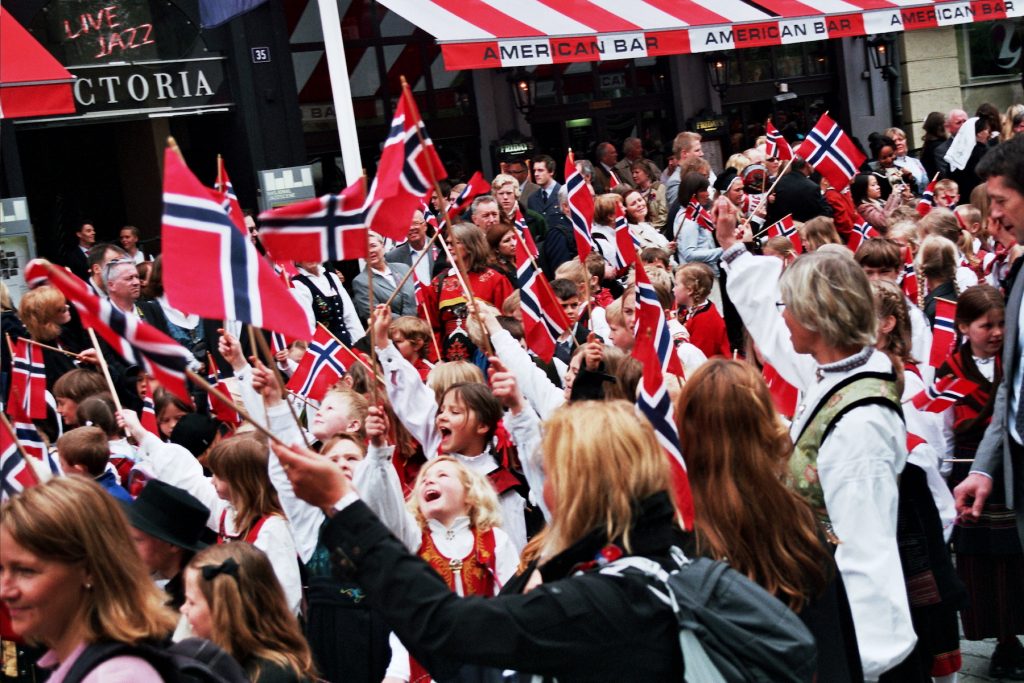
Norway’s the happiest country on earth. Be more Norway
So 20 March 2017 was Happiness Day. That’s right, an entire day filled with rainbows and soft-centred doughnuts and smiling at strangers in the street and all the things that make you go all gooey inside (like the doughnuts).
Who’s behind such a joyful day? The Ministry of Fun and Games? The Centre for Practical Jokes? No, it’s the . That’s right, the huge international organization more normally associated with peacekeeping or human rights. And according to the UN, the International Day of Happiness has a pretty serious purpose – it wants people (and governments, and schools, and businesses) to focus on well-being – not just making more money.
The UN doesn't set laws or policy for its member nations, but it does act as a sort of guiding compass for what countries should be working on. One of those things is “happiness”. Every year since 2012 the UN has released a “World Happiness Report” which ranks countries (yay, Norway) based on their overall levels of happiness.
The International Day of Happiness basically acts like a viral advertising campaign for the report, and the concept – give it an International Day and a hashtag, and everyone starts talking about it (including us). This year they even got the smurfs in on the promotion.
Why Happiness?
Traditionally, countries have measured their success in (which stands for gross domestic product, if you’re interested). Even if you don’t know exactly what it is, you’ll probably have heard politicians or newscasters talking about this administration’s or that government’s ability to raise GDP. GDP is basically a way of measuring how much a country produces, used to demonstrate its economic ‘strength’.
GDP was actually a really big deal when economists came up with it in the 1930s. Before GDP, policy makers would look at rougher measures like the stock market or the amount of tax the government brought in to try to judge how the economy was doing. GDP gave a much more straightforward summary of whether the economy was growing or shrinking.
Economists still sometimes get teary eyed about how great GDP has been. One of them, Paul Samuelson, who was given the Nobel Prize, described it as “truly among the great inventions of the 20th century, a beacon that helps policymakers steer the economy toward key economic objectives”.
But some people have questioned whether GDP is the best way of measuring economic success. They argue that just because a country is good at producing stuff it doesn’t mean the people who live in it are better off.
The UN’s former big dog, (or former Secretary General) Ban Ki-moon said the world “needs a new economic paradigm that recognizes the parity between the three pillars of sustainable development. Social, economic and environmental well-being are indivisible. Together they define gross global happiness”.

WTF is an economic paradigm? Still not sure, but in other words, he’s saying that GDP doesn't take into account things like the environment or gender equality, which many people think are also part of the government’s job. He’s saying you can’t separate social well-being from economic well-being. The UN’s report uses China as an example. GDP in China has soared in the past twenty-five years, but other measures of well-being have gone up and down .
The UN uses its happiness report as one of the ways to measure things GDP misses, but other organizations have proposed different indicators. The World Economic Forum (another big international organization) suggests five goals, including things like health, fairness, and the environment. The OECD (another big international organization) recommends looking at issues like food security, gender, and good governance.
But these alternate indicators, like happiness, are often strongly correlated with GDP. Richer countries do tend to rank higher in happiness than poorer countries. But money isn’t everything. Some economists argue that once countries reach around $15,000 to $20,000 GDP per person, additional wealth stops bringing more happiness. The idea is that people need the economy to provide some basic level of support, but after that other things are more important.
While many countries do talk about GDP a lot, it's not all they talk about. There are plenty of people talking about what kinds of things should be doing, and how to measure success. Many people are looking at gender equality or environmental protection or education with measurements that target those issues.
What’s in the rankings?
Norway came out on top this year, moving up four places from last year to beat out last year’s champ Denmark. Overall, the ratings are very similar to last year and the countries in the top ten didn’t change at all. The US comes in at number fourteen and the UK at number 19. At the bottom of the list are countries with a history of civil war like Rwanda (151), Syria (152), and the Central African Republic (155). See the complete listing here.
To calculate it, the UN rankings combine six measures: GDP per capita, healthy years of life expectancy, social support, trust, perceived freedom to make life decisions, and generosity. The data is a mix of information reported by governments, like GDP, and survey responses from residents of the ranked countries. The writers of the report took more than 3,000 surveys in each of the 155 countries asking respondents to rank their quality of life.
Measuring things in addition to wealth gives countries a better idea of how well their programs are impacting different parts of life. But measuring things like trust or generosity can be tricky, and the UN’s numbers don’t necessarily provide a complete picture. For instance, trust is measured as the absence of corruption, and generosity is measured as the amount of charitable donations. But trust can mean a lot of things – a lack of corruption can tell us about trust in the government, but might not translate to trust in society as a whole. Charitable contributions are one part of a generous society, but giving to charity doesn't necessarily mean you’re going to give that cup of sugar to your neighbor.
So what?
It’s unlikely that governments will stop calculating GDP any time soon. But, the Happiness Report and the International Day of Happiness are good reminders to everyone, especially economists, that maybe money isn't all that matters.



